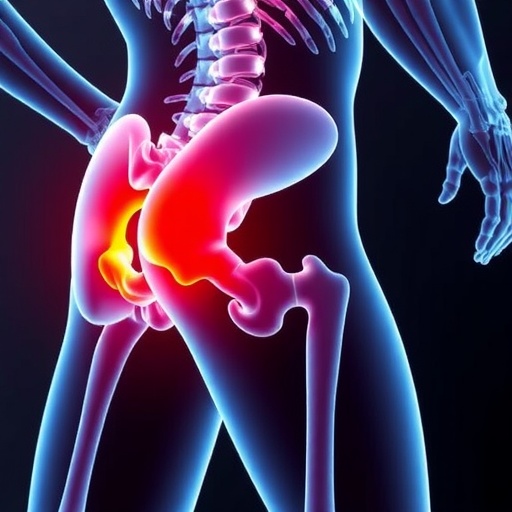In a significant advancement for geriatric health, a recent clinical trial has shed light on the effectiveness of calcifediol supplementation in older adults recovering from hip fractures. Hip fractures, often resulting from falls, represent a major health concern among the elderly, leading to decreased mobility, increased risk of further injuries, and a decline in overall quality of life. As the global population ages, understanding how to optimize recovery for this vulnerable demographic has become crucial.
The study conducted by Cuadra-Llopart et al. explores two specific regimens of calcifediol supplementation. Calcifediol, also known as 25-hydroxyvitamin D, plays a pivotal role in calcium absorption and bone metabolism. Recognizing that vitamin D deficiency is prevalent among older adults, especially those with limited sun exposure, the researchers aimed to determine how supplemental calcifediol could influence healing outcomes after hip surgery.
The clinical trial involved a controlled study design, enrolling a diverse group of participants aged between 65 and 85. Each participant was subjected to a thorough medical evaluation to gauge baseline vitamin D levels and overall health status. Following the hip fracture surgeries, these individuals were randomly assigned to one of two distinct supplementation regimens aimed at restoring adequate calcifediol levels in their systems.
One regimen provided a higher dose of calcifediol, while the other offered a standardized lower dose, allowing researchers to compare the healing effects of varying supplementation intensities. These differences were anticipated to elucidate the optimal dosage required to expedite recovery and enhance overall well-being in post-surgical older adults.
Throughout the trial, participants were closely monitored for several health metrics, including bone density, pain levels, mobility progress, and overall vitamin D status. The researchers sought to pinpoint not only the biological impacts of calcifediol but also its contribution to improving functional outcomes — a critical factor for older adults who may already be dealing with multiple health challenges.
As the trial progressed, preliminary results began to emerge. Early findings indicated that older adults receiving the higher calcifediol dosage exhibited significant improvements in pain management and mobility activities. Participants in this group reported less discomfort during physical therapy sessions and demonstrated quicker recovery times compared to those on the lower regimen. Sources of pain, often exacerbated in the elderly due to frailty, appear to have lessened in correlation with the higher supplementation levels.
Furthermore, an intriguing aspect of the study is its exploration of the dual role of calcifediol — not only in promoting bone healing but also in potentially enhancing muscle strength. For older adults, muscle mass and strength are crucial determinants of overall health, significantly influencing recovery trajectories following surgeries. The impact of calcifediol on muscle function offers new insights into comprehensive recovery strategies.
The researchers also undertook extensive statistical analyses. By examining the interrelations between calcifediol levels, healing metrics, and participants’ overall health, they could establish evidence-based associations. Such robust analytical frameworks bolster confidence in the trial’s findings, establishing a foundation upon which future research can build.
The implications of these findings extend beyond clinical practice. They point toward vital public health strategies emphasizing the necessity of maintaining adequate vitamin D levels throughout the aging process. As healthcare systems globally grapple with the implications of an aging population, innovative solutions such as effective supplementation regimens could alleviate some of the burdens associated with geriatric healthcare.
In light of the results, there is a growing consensus among healthcare professionals regarding the need for routine screening of vitamin D levels in elderly patients, particularly those at risk for falls or those recovering from surgery. By integrating calcifediol supplementation into standard post-operative care, we could significantly improve patient outcomes and enhance the quality of life for older adults confronting the challenges of recovery.
The study highlights the critical partnership between nutritional science and geriatric care — a field ripe for exploration as we delve deeper into how dietary interventions can complement traditional medical practices. With aging populations becoming more prevalent, continued research into vitamin D’s multifaceted roles stands to benefit both individuals and healthcare systems.
Looking forward, researchers express optimism that these findings will stimulate additional investigations into tailored nutritional strategies aimed at older populations. Such efforts could drive forward a broader understanding of nutrient interactions and their impacts on health, particularly in the context of recovery from serious injuries like hip fractures.
In conclusion, the efficacy of calcifediol supplementation elucidated in this clinical trial presents a promising avenue for enhancing recovery among older adults post-hip fracture surgery. As society strives toward optimizing health outcomes for the elderly, these findings serve as a critical reminder of the importance of nutritional health in promoting resilience and recovery at every stage of life.
Subject of Research: Efficacy of calcifediol supplementation regimens in older adults post-hip fracture surgery.
Article Title: Efficacy of two calcifediol supplementation regimens in older adults post-hip fracture surgery. A clinical trial.
Article References:
Cuadra-Llopart, L., Salvà Casanovas, A., Cerdà Mas, G. et al. Efficacy of two calcifediol supplementation regimens in older adults post-hip fracture surgery. A clinical trial.
Eur Geriatr Med (2025). https://doi.org/10.1007/s41999-025-01303-y
Image Credits: AI Generated
DOI: https://doi.org/10.1007/s41999-025-01303-y
Keywords: calcifediol, supplementation, hip fracture, elderly, clinical trial, vitamin D, bone health, recovery, mobility, geriatric health.




